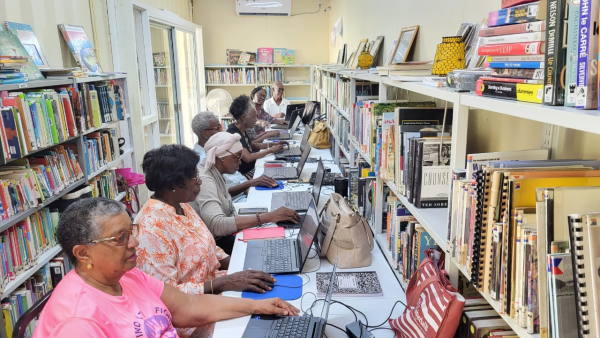 To: Chairpersons of the Parliaments of Aruba, Curaçao, and Sint Maarten
To: Chairpersons of the Parliaments of Aruba, Curaçao, and Sint Maarten
Subject: Request for Agenda Inclusion and Speaking Rights at IPKO February 2026
A coalition of youth representatives from the six Caribbean islands and the Caribbean community in the Netherlands has issued an urgent appeal to the parliamentary leaders of Aruba, Curaçao, and Sint Maarten. The request centers on the upcoming Interparliamentary Kingdom Consultation (IPKO), scheduled for February 17, 2026, in Aruba. The group seeks to address the climate crisis as a shared responsibility within the Kingdom of the Netherlands and to advocate for structural solutions that ensure the rights and safety of Caribbean residents.
Climate as a Shared Responsibility
The youth representatives emphasize the existential threat posed by the climate crisis to the Caribbean part of the Kingdom. While the Netherlands benefits from robust frameworks like the Delta Act and consistent financial support for climate adaptation, the Caribbean islands lack similar guarantees. This disparity leaves Aruba, Curaçao, and Sint Maarten vulnerable, as they are unable to independently access critical international climate funds due to their constitutional status within the Kingdom.
The group highlights the upcoming court ruling on January 28, 2026, in the climate case brought by eight Bonaire residents and Greenpeace against the Dutch State. This case underscores the need for a Kingdom-wide climate adaptation plan developed in close collaboration with local communities. The youth representatives view this as a precedent for safeguarding human rights through the Kingdom’s guarantee function (Article 43 of the Charter), while respecting local autonomy and self-determination.
Local Expertise and Scientific Collaboration
The Caribbean islands are home to a wealth of talent and expertise in climate science and adaptation. Initiatives like the Feelin’ Hot Tool demonstrate the capacity for local innovation, but these efforts often remain limited to short-term projects. The youth representatives argue for a structural approach to climate adaptation, rooted in collaboration across the Kingdom. They call for the Netherlands to facilitate resources while allowing the islands to lead, in line with the principle of mutual assistance (Article 36 of the Charter).
Formal Requests
The youth representatives formally request the following:
1. Agenda Inclusion: That climate adaptation and the implications of the upcoming Bonaire climate case ruling be added as a permanent agenda item for the IPKO meeting on February 17, 2026.
2. Speaking Opportunity: That Oriana Wouters, a youth representative from Aruba, be granted 5-10 minutes to present the local perspective during the opening of this agenda item.
A Call for Kingdom-Wide Action
The youth representatives stress that the IPKO is the ideal platform to address the Kingdom’s shared climate challenges. They urge the parliamentary leaders to seize this opportunity to foster collaboration and ensure a sustainable future for all parts of the Kingdom.
Signatories:
• Oriana Wouters (Aruba)
• Terence Ching (Curaçao)
• Riddhi Samtani (Sint Maarten)
Representing Caribbean Youth within the Kingdom
Footnotes
1. At COP30, international agreements were made to significantly increase financial resources for climate adaptation. However, the constitutional status of the CAS countries within the Kingdom limits their direct access to these funds, leaving them reliant on the Dutch government’s policies.
2. See also: Misiedjan, D.J.E. (2021). "Separate but equal in the protection against climate change? The legal framework of climate justice for the Caribbean part of the Kingdom of the Netherlands."
This appeal underscores the urgency of addressing climate justice and adaptation as a Kingdom-wide priority, ensuring that no part of the Kingdom is left behind in the fight against the climate crisis.
Click, Connect, and Thrive: Seniors in the Digital Age.
 PHILIPSBURG:--- With fresh topics and familiar goals, the Cyber Senior workshop series returns for another 8-month session. This initiative empowers mature adults to engage, explore, and excel with today’s digital tools, technologies, and resources that enhance their well-being.
PHILIPSBURG:--- With fresh topics and familiar goals, the Cyber Senior workshop series returns for another 8-month session. This initiative empowers mature adults to engage, explore, and excel with today’s digital tools, technologies, and resources that enhance their well-being.
Registration opens on Monday, January 26, 2026, and will close on Saturday, January 31, 2026. Classes begin on Tuesday, February 3, 2026, at Belvedere Estate #3, Belvedere Satellite.”
Our dedicated Cyber Senior Media Coaches look forward to welcoming both new and returning students to a program rich with learning, growth, and opportunity. To register, contact the Sint Maarten Library at +1-721-542-2970 or email This email address is being protected from spambots. You need JavaScript enabled to view it.. Enrollment is limited, so early registration is recommended.
Empower yourself or a loved one with essential digital skills that promote independence, convenience, and meaningful connection. Join the Cyber Senior Program and take the next step toward digital confidence.
Stay connected with us on Facebook, Twitter, Instagram, and YouTube for updates and resources.
National Alliance Congratulates Michael Peters on Appointment at PJIA.
PHILIPSBURG:--- The National Alliance Party congratulates St. Maarten’s very own Michael Peters on his appointment as Operations Director at Princess Juliana International Airport.
Michael’s story is one we love to see. He started out as a summer employee and, through hard work, discipline, and commitment, worked his way up to one of the most important operational roles at our national airport. That kind of growth does not happen by chance. It happens when talent meets opportunity and when people are willing to put in the work.
As a son of the soil, Michael Peters is proof that local professionals can lead at the highest levels when they are given the chance. His deep knowledge of the airport and steady rise through the ranks show the value of investing in people who understand our institutions and care about doing the job right.
The National Alliance believes strongly in empowering our own. Building St. Maarten means trusting local talent, supporting growth, and creating pathways for our people to succeed. Michael’s appointment sends a positive message to young people across the island that dedication and perseverance truly matter.
We wish Michael Peters continued success as he takes on this important responsibility at the heart of our country’s main gateway.
Business Hoops SXM Continues to Invest in the Future of Local Basketball.
 PHILIPSBURG:--- Business Hoops SXM once again demonstrated that its vision extends far beyond organizing competitive tournaments, as the organization made a meaningful contribution to youth basketball development on Thursday night at the L.B. Scott Sports Auditorium.
PHILIPSBURG:--- Business Hoops SXM once again demonstrated that its vision extends far beyond organizing competitive tournaments, as the organization made a meaningful contribution to youth basketball development on Thursday night at the L.B. Scott Sports Auditorium.
Following an exciting Souliga Youth Basketball Association (SYBA) game, Business Hoops SXM officially presented a new iPad to SYBA during a brief ceremony at 8:00 PM. The donation was made by the founders of Business Hoops, Jose Helliger and Cleon Frederick, and accepted by SYBA President Jamal Newton.
The tablet will play a vital role in helping SYBA modernize its operations, enabling the association to more efficiently track player statistics, including scoring, rebounds, assists, and overall game performance. According to SYBA officials, improved data collection will enhance player development, evaluation, and long-term planning for the league.
This initiative is in line with Business Hoops SXM’s broader mission—one that prioritizes giving back to the sport and strengthening basketball's grassroots foundation. While Business Hoops has become widely known for its high-energy corporate tournament, the organization has consistently emphasized that community impact and youth development remain at the heart of its efforts.
That commitment will be on full display during the 2026 Business Hoops Tournament, which runs from January 28 through February 7. Adding to the excitement, two SYBA games will be featured on Saturday, January 31, allowing young athletes to compete on a larger stage and in front of a wider audience.
As Business Hoops SXM continues to grow, moments like Thursday night’s donation serve as a reminder that the true value of sport lies not only in competition, but in investment—investment in young players, strong programs, and a sustainable future for basketball on the island.
For full game schedules, tournament updates, and more information, visit businesshoopssxm.com. Fans are also encouraged to follow Business Hoops SXM on Facebook, Instagram, and YouTube for ongoing coverage and highlights.
CPS calls on Community to Continue to Eliminate Mosquito Breeding Sites. Tip it, toss it, cover it.
PHILIPSBURG (DCOMM):--- The Collective Prevention Service (CPS) calls on the population to step-up mosquito prevention measures after every rainfall event.
The proactive elimination of mosquito breeding sites is a cornerstone of effective public health management, serving as the first line of defense against the spread of debilitating diseases such as Dengue, Zika, and Chikungunya.
By identifying and removing sources of stagnant water—ranging from discarded containers to clogged gutters—communities can drastically reduce the population of Aedes aegypti at their source.
Ultimately, maintaining a "clean and dry" environment is not merely a household chore; it is a vital civic responsibility that safeguards the most vulnerable members of the population and ensures a healthier, more resilient community.
Mosquitoes breed in small amounts of standing water, especially in containers around homes and businesses (e.g., buckets, plant saucers, discarded items, tires, clogged gutters).
Mosquitoes are often active during the daytime, with biting frequently occurring outdoors in shaded areas and it can spread through transport and trade when eggs/larvae are moved in water-holding items.
Eliminating breeding sites is the most effective way to reduce mosquito populations. We urge everyone to take the following actions at least once per week: Tip it, toss it, cover it.
Empty and scrub containers that hold water: buckets, coolers, flowerpot saucers, pet bowls, vases, toys, tarps. Properly dispose of unused items that collect rainwater.
Cover water storage. Ensure cisterns, drums, and barrels are securely covered with tight lids or fine mesh. Clean drains and gutters. Remove leaves and debris to prevent water from pooling.
Manage tires and bulky items. Store tires under cover or disposing of them properly—tires are a high-risk breeding site. Businesses and property managers, construction sites, tire shops, marinas, and rental properties are asked to intensify weekly checks and maintain premises free of standing water.
Mosquito control cannot be achieved by government services alone. It requires sustained action by households, communities, and businesses across the entire island.
By working together, we can reduce breeding sites, lower mosquito populations, and protect residents and visitors.
To report any concerns with mosquito breeding or for any assistance, contact CPS’ vector control team by phone +1(721) 520-4161, 542-1222/1570, or 914.
Vector control can also be contacted by email at: This email address is being protected from spambots. You need JavaScript enabled to view it.